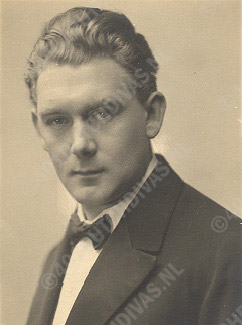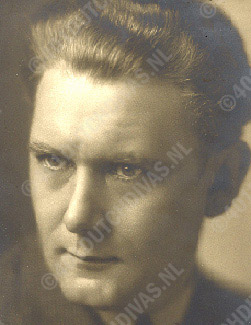Jozef Sterkens
 |
 |
Jozef Sterkens (pseudonym of Jozef Steuren) was born in Antwerp, Belgium on 11th March, 1893. His parents, who kept a laundry, belonged to the middle-class of the city. As he was a good scholar, his parents wanted him to become a teacher, so in 1908 they sent him to Ghent, where he studied at the Normal School, he was a dreamy boy and his studies didn't interest him very much. However, he had the chance to receive music-lessons from the Flemish composer Emiel Hullebroeck, and his teacher soon discovered that he had a beautiful tenor voice. Hullebroeck suggested that he take singing-lessons, but financial circumstances obliged him to become an art-teacher after he had finished his studies. . .
By the outbreak of World War I he was mobilized and served four years as a nurse in a military hospital. At the front he sang for the soldiers from time to time, together with other Flemish artists. He was decorated four times during his military service.
After the armistice, he returned to Antwerp and returned his profession as an art-teacher at the Royal Atheneum. At the same time he studied music at the Royal Flemish Conservatory.
In 1923, he sang for a music-critic of a local paper. The man was so enthusiastic about his voice that they together approached Edmond Borgers, who was at that time the leading heldentenor at the Royal Flemish opera. After hearing his 'Grahlserzählung' from Lohengrin, Borgera decided to give Sterkens singing-lessons. In 1924, Sterkens started his singing-career, interpreting compositions of Flemish composers like Peter Benoit, Jan Blockx, Jef van Hoof and Renaat Veremans. Veremans, who was alsoconductor at the opera, became his lifelong friend. Sterkens gave his first recitals in the concert hall of the Antwerp Zoo, mostly before a Flemish-speaking audience. Readers not familiar with the linguistic situation in Belgium should know that, in those days, the Dutch-speaking part of the country (Flanders) was completely dominated by the French-speakers and that the French bourgeoisie was under the influence of French culture. Jozef Sterkens would become an important figure in the Flemish struggle for cultural liberation.
In 1925, Sterkens left his post at the Atheneum and was engaged by the director of the Royal Flemish Opera for the 1925-26 season. His debut was not a brilliant one, as he had only a single note to sing for his role as Ulrich Eisslinger in Die Meistersinger van Nürnberg.
At that period Antwerp had two opera houses, the Royal Flemish Opera, founded 1890, and the Royal French Opera, founded in 1834 and closed in 1933. In the Flemish house, Dutch versions of mostly German and Flemish works were given while, in the French house, the emphasis lay on French versions of Italian and French works. The public in the Flemish house was mainly composed of Flemish nationalists, while the French felt more at home in the 'Royal Francais'. The singers in the Royal Flemish Opera were part of a roster, each expected to sing a variety of parts, large find small. Sterkens became a member of this ensemble, singing all the roles suitable for his lyric tenor. One of his first big successes was .the part of Tamino in Die Zauberflöte. In 1927, be became the first lyric tenor of the company. He was also a concert singer and sang the Matthew Passion of Bach under the baton of the famous Antwerp conductor Lodewijk De Vocht. On the 2nd June, 1928, he sang this work in the Salle Pleyel in Paris with Vera Janacopoulos (sop.), Theodora Versteegh (contralto), Koen Jochem (bass) and Willem Ravelli (bass) under De Vocht. I presume that it was at that time that Sterkens made his first recordings for 'La Cie Francaise du Gramophone'. He also began singing regularly before the microphones of the National Radio Institute in Brussels and in Hilversum.
In Antwerp he took part in the Dutch creations of the following works: Sadko (1925), Paganini (1927), Jenufa (1927), Sly (1929), Die tote Stadt (1932) and Daphne (1939). In 1931 he made his film-debut as a singer in a musical picture The Song of Nations. In 1934 he acted and sang in the first spoken Flemish picture, from which he recorded several songs written for him by his friend Veremans.
In November 1929 and March 1931 he sang Plorestan opposite the Leonore of Lotte Lehmann. Lehmann sang regularlv at the Flemish Royal Opera between 1928 and 1931. In 1935, at the height of his popularity, he accepted the directorship of the house where he had made his debut in 1925, so his singing-career lasted only ten years. After 1935 he would appear only three tirmes on stage. In 1937 he sang the creation of a local work by Veremans, called Anne-Marie. In 1939 he sang in the Dutch creation of Daphne, for which Richard Strauss came to Antwerp to supervise the rehearsals, and in 1943 he sang his last Florestan, in Brussels.
His direction of the Royal Flemish Opera was characterised by many -technical renovations, especially the lighting. He had learned much about its importance when working in films at the UFA studios in Berlin in 1934. He also broke completely with the tradition of parochialism by enlarging the repertory to include French and Italian works after the closure of the Royal French opera in 1933. Last but not least, he created better working-conditions for the whole company. All artists were engaged 12 months a year. His skill in accountancy helped the house out of financial difficulty within two seasons.
He remained in this post until the season of 1942-43. In 1942, the city council nominated a general manager for the two official theatres in Antwerp. Sterkens was nominated deputy manager, but he was not on very good terms with his chief and soon resigned. In the same season he accepted the directorship of the Alhambra Theatre in Brussels. There he organised Dutch comedy and opera and made his ultimate appearance as a singer. The Alhambra Theatre had a bad reputation during the war as it was used by the Germans to give 'Wehrmachtsvorstellungen', and the Flemish fascists used it for their meetings. It was obvious that Sterkens's acceptance of this post would turn out badly for him. Soon after the liberation of Antwerp in September 1944, he was imprisoned for two weeks in the lion's cage of Antwerp Zoo together with other collaborators. Then he was transferred to the central prison, where he spent eight months in bad conditions.
Sterkens was liberated in April 1945, while the war was still going on, but lost his civil rights for a year. He spent the last years of his life forgotten by most of his former friends. Just as he should have been rehabilitated and the post of chairman of the musical copyright society was offered to him, Sterkens died of a heart attack on 3rd May, 1952.
Jozef Sterkens made 44 recordings between 1928 and 1934. Of the operatic excerpts, only the Rosenkavalier aria and Werther arias are sung in the original language. These three recordings are among my favourite 78s of him, because the enunciation is perfect and the delivery very distinctive. Distinction is a characteristic of all his performances:
even the film-songs are well sung without exaggeration. Sterkens may be compared with Julius Patzak, who had the same qualities and limitations, especially m the upper range.
I am indebted to Miss Maria Feyens of Antwerp for information about a now-forgotten singer of the past. Miss Feyens was a prompter at the official theatres in Antwerp for a period of more than forty years and knew Sterkens during the last ten years of his life.
Jozef Sterkens sang at the Royal Flemish Opera, Antwerp 1925 to 1935
Count Richard (Das Lied der Liebe - Korngold)
Duke (Rigoletto)
Eisenstein (Die Fledermaus)
Enrico (La Campana Sommersa)
Erik (Der fliegende Hollander)
Faust (Faust)
First knight (Parsifal)
Florestan (Fidelio)
Foma Nazaryich (Sadko)
Francois Villon (Vagabond King - Friml)
Fritz Kobus (L'Amico Fritz)
Gennaro (I Gioielli della Madonna)
Goethe (Friederike - Lehar)
Gratiaan (Beatrijs - Lelien)
Hans (Prodand Nevesta)
Heinrich (Tannhäuser)
Hindu merchant (Sadko)
Hoffmann (Les Contes d'Hoffmann)
Italian Singer (Der Rosenkaralier)
Knight Hendrik Reingemoet (Het Mirakel -Renaat Veremans)
Laca (Jenufa)
Lohengrin (Lohengrin)
Maarten (Vlammend Land - Kurt Atterberg)
Marcel (La Boheme - Leoncavallo)
Merlijn (Herbergprinses- Jan Blockx)
Nando (Tiefland)
Narraboth (Salome)
Paganini [Paganini)
Pedro (Tiefland)
Pinkerton (Madama Butterfly)
Quinten (Quinten Massijs -Emile Wambach);
Remendado (Carmen)
Shepherd (Die totenAugen)
Sly (Sly)
Snep (Marieke van Nijmegen - Frans Uyttenhove)
Stefan (Der lustige Bauer - Fall)
Tamino (Die Zauberflöte)
Tjalda (Princess Sunshine - Paul Gilson)




